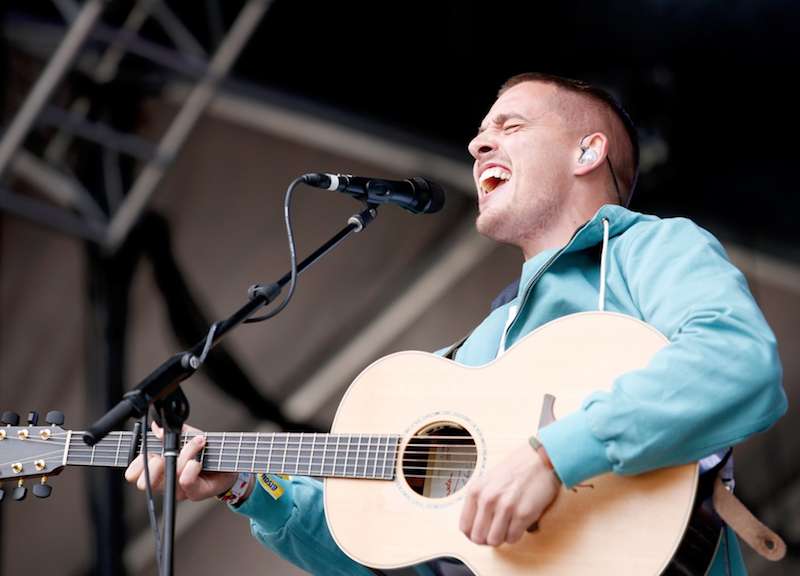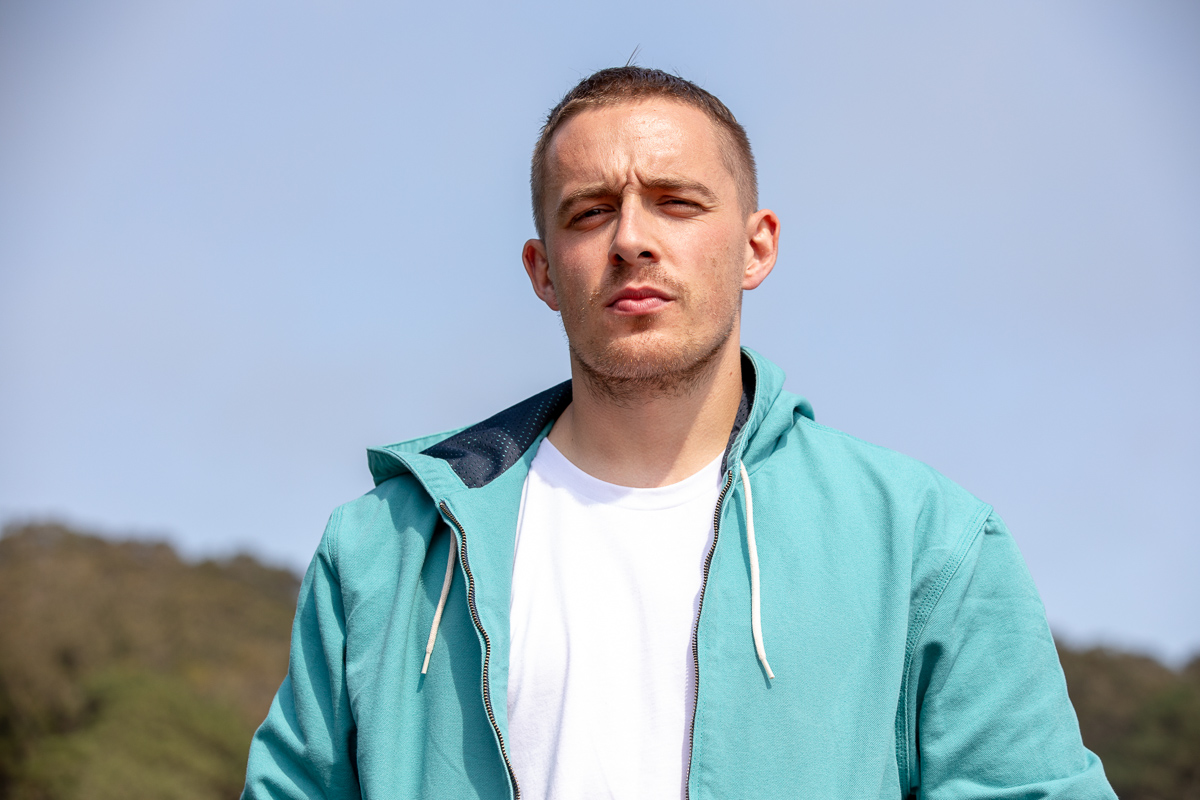
Dermot Kennedy just brought to a close his American headlining tour last week. The Irish newcomer, hailed a fast rising-star at SXSW in March this year, went from strength to strength releasing his mixtape Mike Dean Presents: Dermot Kennedy — which saw Dean, a hip-hop heavyweight, at the helm of the 5-track tape — earning a stop at NPR’s Tiny Desk, and more recently releasing his latest track “Power Over Me.” He has lived up to all the buzz and expectation with a 42-date world tour that has sold out in all cities.
In August, we caught up with Kennedy in San Francisco, at his first Outside Lands Festival, after his set on the Sutro stage. He played early in the day but already had a substantial following and a large crowd had turned out to watch him. His set highlighted the raw intimacy that he casts with quiet, finger-plucked songs — such as “Malay,” “All My Friends” and “Young & Free” — delivered in his rare cadence and soaring, full-bodied vocals. It’s a treatment that works particularly well on “Glory,” one of his outstanding breakout singles.
At the media tent, Kennedy was relaxed and chatted about his classical music roots; working with the Grammy-winning, hip-hop legend Dean (2Pac, Snoop Dogg, Beyoncé); and trying to find that balance between the acoustic, singer-songwriter roots that he began in and the hip-hop crossover he currently enjoys.
Unfortunately, still no word on his debut.

How does Outside Lands stack up against the other festivals you’ve done this Summer?
It’s really beautiful, especially where we are – it’s like woodlands, it’s so nice, and this is the last summer festival we’re on. I don’t have to worry about my voice, or doing something else tomorrow. And where we performed, it was sloped like an amphitheater; amazing to sing there.
Nick Mulvey opened that stage before you and he’s got quite a following and been around longer. It’s always interesting to me when a younger or up-and-coming artist is billed above a more established artist like that. But he got a good crowd turnout too.
Yes. It’s weird. And you can get caught up with that. But as long as people turn up to listen, then, that’s all that’s important.
Glen Hansard gave you some great advice early on in your career about not getting caught up with whose name appears first on a poster. Can you share that with us?
He had done a gig where he had invited a bunch of Irish musicians to play with him: Damien Dempsey, Lisa Hannigan, myself and some up-and-coming ones. I was talking to him after and said how it was really cool for him to invite all these new artists. He said, the moment you think it’s important that your name is on the poster, it’s all over. All that matters is essentially the music, friendships, the camaraderie and the vibe we try to create. That’s been such a good thing for me to kind of stick to – I was having this conversation at Radio Milwaukee last week, and we were saying Wisconsin and Eau Claire, some of these areas feel like they have the same values creatively: music is the only thing that matters.
Ah, Eau Claire. You have a musical hero from those parts? What’s it like to be able to do what your musical heroes do?
Yes. (smiles) I saw him [Justin Vernon] recently—well, his band Bon Iver played at the Santa Barbara Bowl. It was incredible! The fact that they exist really keeps me in line, to be the best that I can be; he sets the bar so high for me personally. It’s such a good reality check; that’s what musical heroes are for me.
Let’s back up a bit on how you ended up working with Mike Dean. You came from a completely different musical background.
Ha ha! Just a random connection got made through my label, Interscope. It just worked. He’s a hip-hop legend and I’m trying to do my thing from the acoustic side of the world. I played him some of my stuff and he said it’s the type of thing that he and Kanye would listen to, in terms of ideas and [being] inspired. I never thought too much of it; about how we are from different worlds, it just felt like a beautiful atmosphere.
After you heard the tracks, did you think “he’s given it that Mike Dean treatment”?
Oh, for sure! He brings something to it because these songs existed already. We didn’t write the songs together; he had free reign to play with them and do what he does. And it was so awesome—to see that at work was crazy.
What was your takeaway from that experience with Mike Dean?
It re-cemented the fact that he brought out six albums this summer: The Kanye/Kid Cudi album, Nas, Travis Scott … I think he’s like 53 and his commitment to music is still so intense. I’m sure he can just sit back and chill but he still did six albums! His commitment to doing good art is inspiring to me and I texted him to tell him that. And I wouldn’t do that if I didn’t really think it. I don’t just text people to make connections.

Does it ever get awkward that your record label tries to put you in touch with someone and you don’t think it’s working or what you want?
For sure. But for someone as solid as Mike Dean, if something goes wrong it’s very likely that it’s my fault – you know what I mean. (laughs) Yeah, of course, you work with so many different people and it’s not going to work every time. If I hear about someone I’m going to be working with, I often don’t search their catalogue because I don’t want to be intimidated; I want to go in as myself and I want them to do the same thing too. But sometimes things just don’t click. I don’t think anyone I’ve worked with will think it’s a bad vibe, it just doesn’t work.
Do you go along and work with someone even if you don’t know if it’s going to work between you?
Yes, it’s a real trial and error. Because if you do find that someone that you click with and can with consistently, then it’s worth it, right?
How many people do you think you’ve gone through to get to that one person that’s a good fit?
(Laughs) I don’t know. I’m not sure. To be honest, one of them is this guy in London called Kerry Willerton – he was the very first person I worked with and he’s so solid. If you can find one or two people who have been there from the start, I think that’s really important.
What will you do next – more acoustic or atmospheric, hip-hop style music?
I think I can do either; that’s the beauty of where I’m at. I am free to do whatever I want sound-wise. I could make an acoustic mixtape with seven songs: me, a guitar and piano, and I think people will be really into it. Or I could push out of my comfort zone and do more Mike Dean kind of stuff. I’m trying to take everything good about the acoustic side – the intimacy, the lyrics and rawness – then build on that production-wise without losing any of that rawness, that balance. That’s my challenge.
There’s definitely a trend with artists to blend genres at the moment; increasingly, genres don’t seem to matter.
I think you’re right, genres matter less and less. You know, I still want to carry on with my acoustic guitar and piano. I would never push a song into the hip-hop world just because I feel it’s a good idea. I would only do it if the song deserves it. So everything that is happening right now, it’s happening naturally. “A Closeness” was the first time that things got hip-hoppy and that was with Kerry in London. That’s kind of what started me down this path – and that was written solely for the guitar and piano; that’s still the best way for me.
Would you say your classical background has helped?
For sure. I wish I was more open to being helped by it because I was in college being schooled in classical training. I didn’t want to be there, I wanted to be out, doing this. I didn’t really pay attention the way I should have. I was surrounded by top-class musicians and lecturers but because it was classical, I acted like it wasn’t for me. But it was! And it was the greatest thing I could have done. So I should have probably paid more attention.
Any plans for a full-length on the horizon?
I will, but I’m not sure. It could be a mixtape or an EP. I’m not in a rush it to do a full-length album. I’ve got hundreds of songs, I’m just taking my time.












